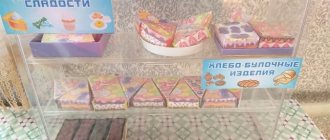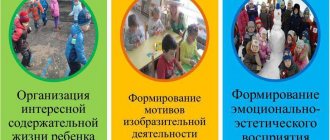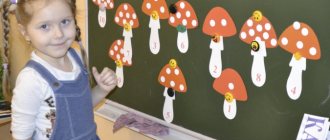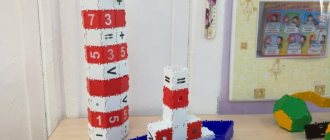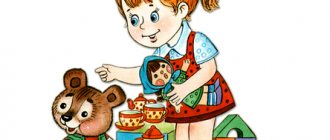Role-playing game "Birthday"
The game reflects children's knowledge about the content of joint labor of family members in the household. Reinforces cultural skills. Improves children's ability to independently create a play environment for a planned plot. Develops spatial thinking and the ability to navigate in space. Fosters friendly relationships between children. Goal : Formation of the ability to apply early knowledge about the surrounding life in the game.
Educational objective : To develop the ability to creatively develop a plot. Learn to complicate the game by expanding the cast of roles and increasing the number of combined storylines. Teach children to assign roles and act according to the role they take on.
Developmental task : To develop the speech activity of children. Reflect in the game knowledge about the content of joint labor of family members in the household. Strengthening cultural skills. Improve the ability to independently create a game environment for a planned plot. Develop spatial thinking and the ability to navigate in space.
Educational task : To foster friendly relationships between children, to develop the ability to take into account the interests of comrades.
Preliminary work
Cognitive development:
- Looking at paintings and pictures:
- Depicting scenes of family life
- Depicting various situations in the store
Speech development:
- Ethical Conversations:
- "On the origin of the surname"
- "Family"
- "Photo of my family"
- "Men and women in the family"
- "My grandmother"
- "Give me joy"
- "Holidays in our family"
- "Going to the store"
- “Seller”, etc.
Artistic and aesthetic activities:
- “My dream house” (plasticine modeling)
- “Harvest” (modeling from salt dough)
- “Confectionery” (plasticine modeling)
- “Mimosas for Mom” (3-D applique)
- “Frame for family photo” (paper design)
- “Portrait of my parents” (drawing)
- “In the garden, in the vegetable garden” (collective drawing work)
- A dramatization of the poem “The Fun Shop” by E.E. Moshkovskaya
Social and communicative development:
- Didactic games:
- "Who needs what"
- "The Fourth Wheel"
- "Confusion"
- "What if?"
- “Who owns this?”
- “Distribute and deliver goods to the store”
- Game “Call by name” The teacher invites children to affectionately and politely address their peers by name, using different variants of address (Lena-Lenochka-Alyonushka, Igor-Igorek, Tanya-Tanechka-Tanyusha, Vova-Volodya-Vovochka, etc.). d.). At the end of the game, the teacher generalizes: “Well done, guys, you politely and affectionately address your peers.”
- Game “Giving out names” First, the teacher, and then the children themselves, come up with names-characteristics, write them on a separate piece of paper, fold them, and then offer to pull them out and determine for whom which name suits best. For example, “Veselushka”, “Sadness”, “Brave”, “Hlebolyub”, “Slastena” (it all depends on the imagination of the teacher and the children). Preschoolers can also come up with nicknames for their favorite animal, reflecting its character in the name: Buddy, Purr, Strekotun , Tail, Stripe...
- Game "Who am I?" Two people are playing - a child and an adult. I am a mother, and who are you to me? I am a daughter, and who are you to me? I am a grandson, and who are you to me? And so on. Complication: Whose daughter are you? Who is your mother's mother? Who is your daddy's sister? Who are you to her? (Child’s reasoning.) How many of us are there in the family? (riddle game option) “In our family we have two mothers, three daughters, two fathers and three sons. How many of us are there in the family?” (Child's reasoning.)
- Game “I want” Children stand in a circle. There is a beautiful rug in the center of the circle. Children are invited to go one by one to the center of the circle, stand on the mat and say about their desire, starting with the words “I want...”. The rest of the children greet the wish with applause, hold hands and together loudly and affirmatively say: “So be it.”
- "Caramel Shop"
- Cafe "Zabava"
Equipment
- Children's furniture (table, chairs, sofa, armchairs, kitchen corner)
- Set of children's dishes (tea, kitchen, dining room)
- Money
- Wallets
- Bags for shoppers
- Stationary counter - 2 pieces, scales, cash registers, robe for the seller
- Set of toys for grocery store
- Set of toys for the “Toys” store
- Set of toys for “Barbershop”
Related games
- "Morning in the Family"
- "Lunch in the family"
- "Evening with the Family"
- "Family Day Off"
- "Guests have come to us"
- "Grocery store"
- "Clothing store"
Intended roles
- Birthday boy
- Mother
- Dad
- Brother
- Sister
- Guests
- Grocery store salesperson
- Shop assistant
- Cashier
- Hairdresser, etc.
Progress of the game
Guys, what holidays do you like?
Do you like the birthday party?
Why do you like him?
Who do you invite to your birthday?
Guys, remember who recently celebrated their birthday?
Let us play “Birthday” and during the game again
Congratulations to our birthday girl.
The birthday girl has a family. Who will we have in this family? (Children independently determine family members)
In addition to his family, he also has friends whom she will invite to the holiday. Friends need to buy gifts, for this we need a salesperson - consultant, cashier. The birthday girl needs to get her hair done, for this we need a hairdresser (children assign roles independently or with the help of symbol cards that lie face down on the table)
What will the birthday girl do? (He will invite friends, go to the hairdresser to get his hair done)
What will her family members do? (Dad will go shopping, mom will set the table, the rest of the family will help mom with housework.)
What will the sellers do? (Prepare the goods for sale; put the goods on display, shelves, evaluate them; pack them; give advice to customers)
What does a cashier do? (Accepts money for purchase)
What will the buyer do? (He selects an item, pays for the purchase, puts it in his bag, says goodbye and leaves)
What will the hairdresser do? (Getting a haircut, washing his hair, styling)
What do guests do? (Enter, greet, congratulate the birthday girl)
What do the owners do? (They invite guests, treat them, offer to play board and outdoor games.)
What do we need for our game? (Home, grocery store, toy store, hairdresser.)
After listening to the children, it is necessary to remind the rules of good manners to be polite towards each other, helpful, use polite words : “Hello”, “Goodbye”, “Be kind”, “please”, “thank you”, “eat to your health”, etc. P.
First, we need to decide where we will have everything and prepare for the game. (Children independently determine what is needed for the game. Determine the place of the game and arrange the attributes)
(Additional roles are introduced into the game as needed.)
Now imagine that you are sleeping at home, and now it is morning. Everyone wakes up, washes, does exercises, and has breakfast.
And now 1,2,3,4,5 - we start playing! (everyone takes their places, the game begins)
Possible development of the game's plot
Store - the buyer enters, greets, examines and selects the product, consults with the seller, puts the purchase in the basket, and approaches the checkout.
When paying for goods, children are faced with the fact that there are no coins in denominations of 3, 4, 6, 7, 9 rubles. If children find it difficult to solve this problem, the teacher helps with leading questions. The conclusion is drawn: the cost of a product can be represented by different numbers of coins of different denominations.
When everything is ready at home, guests arrive. They warmly congratulate the birthday boy, give him gifts, say wishes, play “loaf”, surround him with attention, treat guests, read poetry, sing the song “Happy Birthday”, dance, play board and outdoor games.
When the birthday ends , the birthday boy thanks his guests for a great holiday : And when the guests have left, you need to help “mom” and “dad” clean the house after the holiday. Cleaning the house together is more fun and faster.
Game rating
At the end of the game, you need to share your impressions of the game with the children, discuss interesting moments and mistakes made in the game.
